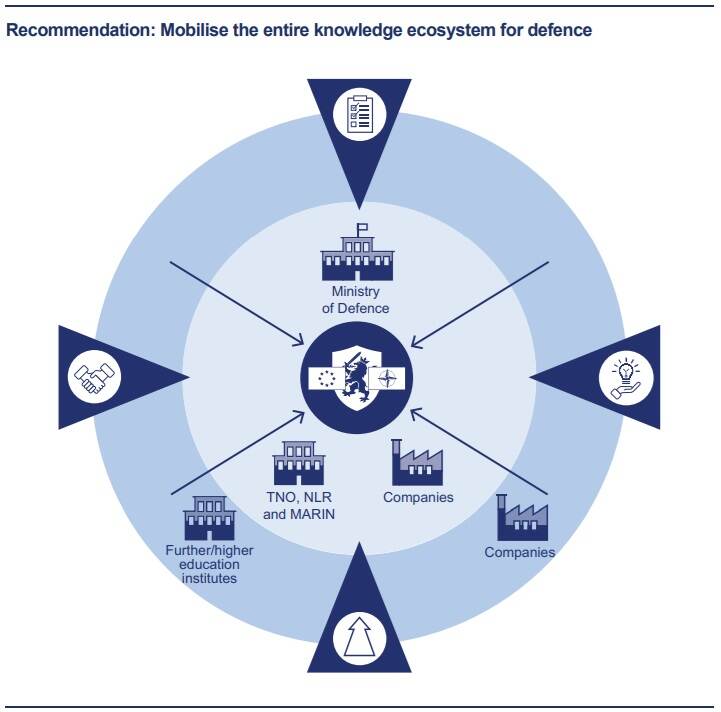Advisory report: Knowledge offensive for defence - Research and innovation for a secure Netherlands
In order to increase our national security, educational and knowledge institutions and the Ministry of Defence must work together more and more closely. The Advisory Council for Science, Technology and Innovation (AWTI) concludes this in its new advisory report: 'Knowledge offensive for defence - Research and innovation for a secure Netherlands'. The AWTI advises mobilizing knowledge as broadly as possible regarding defence research and innovation. The advice contains recommendations for the government and knowledge institutions.
Peace is not self-evident. A conventional war is raging once more on Europe’s eastern borders, bringing a palpable threat to the European continent. Other changes are also putting pressure on Dutch security: technological developments and the increase in hybrid threats are blurring the boundary between war and peace. In this gray zone, cyber attacks and disinformation campaigns are for instance deployed. Moreover, technological developments are happening very quickly, also in the field of defence. It is necessary to align defence research and innovation with the aforementioned new reality if the Netherlands wants to commit itself to peace. The Advisory Council for Science, Technology and Innovation (AWTI) has therefore considered the question: 'How should the Netherlands configure its defence research and innovation efforts?'
Anka Mulder, Vice-chair:
We see that the dimensions on which conflicts are fought are changing, which means that from a defence perspective, knowledge must be collected as broadly as possible. Defence research and innovation must include more collaboration partners.

Mobilise the entire knowledge ecosystem for defence
AWTI sees a number of opportunities for improving the contribution by Dutch research and innovation to strengthening security in the Netherlands and the position of NATO, whilst also reinforcing the strategic autonomy of Europe. AWTI makes four recommendations to mobilise the entire knowledge ecosystem more effectively for defence-related research and innovation.
Focus on reinforcing Dutch strengths in defence innovation
As the Netherlands is too small to address every knowledge and innovation need, it will therefore need to focus systematically on areas where the Netherlands can make a difference, because we are frontrunners in such areas. This systematic approach begins with coordination at NATO/EU level and ends with the development of roadmaps which provide clarity for Dutch stakeholders on the selected topics.
Better scouting of interesting developments
The knowledge base needs to be sufficiently broad to keep pace with developments and be able to scout new fundamental scientific research and relevant developments in civil society. Therefore, AWTI recommends that the Ministry of Defence strengthen the scouting of fundamental scientific research and civil developments with defence potential, and boost its capacity to absorb innovations.
More help for companies to innovate for defence purposes
The defence market has specific characteristics that make it more difficult for companies to enter this market. Therefore, AWTI advises to develop an innovation policy specific to the defence sector. Examples of measures recommended by the AWTI are to strengthen public-private partnerships and facilitate their entry for smaller innovative parties, as well as improving the access to testing facilities for start-ups and small and medium-sized enterprises.
National guideline defence-related research
Educational and knowledge institutions are capable of providing high-quality knowledge relevant to defence and security. These institutions will have to relate to the changing world and the societal urgency of defence and security. With increasing threats and the urgency to protect our society, society's expectations of institutions such as universities and universities of applied sciences are also changing. The AWTI recommends a dialogue between these higher education institutions and the Ministry of Defence to shape the conditions for sustainable collaboration in the field of research. These types of mutual agreements can be laid down in a national guideline.

